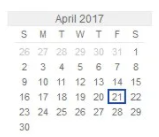Date.prototype.getWeekOfMonth = function(exact) {
var month = this.getMonth()
, year = this.getFullYear()
, firstWeekday = new Date(year, month, 1).getDay()
, lastDateOfMonth = new Date(year, month + 1, 0).getDate()
, offsetDate = this.getDate() + firstWeekday - 1
, index = 1 // start index at 0 or 1, your choice
, weeksInMonth = index + Math.ceil((lastDateOfMonth + firstWeekday - 7) / 7)
, week = index + Math.floor(offsetDate / 7)
;
if (exact || week < 2 + index) return week;
return week === weeksInMonth ? index + 5 : week;
};
// Simple helper to parse YYYY-MM-DD as local
function parseISOAsLocal(s){
var b = s.split(/\D/);
return new Date(b[0],b[1]-1,b[2]);
}
// Tests
console.log('Date Exact|expected not exact|expected');
[ ['2013-02-01', 1, 1],['2013-02-05', 2, 2],['2013-02-14', 3, 3],
['2013-02-23', 4, 4],['2013-02-24', 5, 6],['2013-02-28', 5, 6],
['2013-03-01', 1, 1],['2013-03-02', 1, 1],['2013-03-03', 2, 2],
['2013-03-15', 3, 3],['2013-03-17', 4, 4],['2013-03-23', 4, 4],
['2013-03-24', 5, 5],['2013-03-30', 5, 5],['2013-03-31', 6, 6],
['2013-04-01', 1, 1]
].forEach(function(test){
var d = parseISOAsLocal(test[0])
console.log(test[0] + ' ' +
d.getWeekOfMonth(true) + '|' + test[1] + ' ' +
d.getWeekOfMonth() + '|' + test[2]);
});


Math.ceil(new Date().getDate() / 7)pretty much gives thenthoccurrence of the weekday of given date. Most answers here are talking about week numbers instead of weekday occurrence. For instance, no date can ever be6thoccurrence of weekday (it may indeed fall in the6thweek of that month) – Dogcart